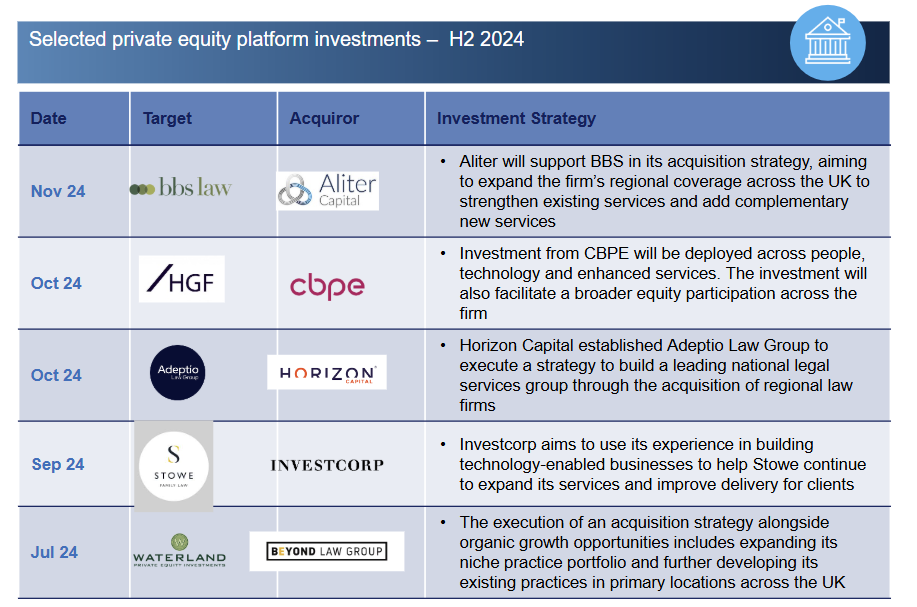Professional services M&A insights – Legal Services

By Jonathan Boyers, managing director at Alvarez & Marsal
Market overview
The UK legal services market is estimated to be worth £50.3bn in 2024, with the top 100 firms accounting for c.65% of revenues, with a fragmented tail of c.9,000 firms accounting for the balance.
The market has undergone significant changes in recent years, characterised by an accelerating trend towards consolidation and a surge in Private Equity investment, continuing the trends witnessed in wider professional services, particularly in accounting. These developments, alongside wider market trends have reshaped the landscape of legal services, introducing new dynamics and challenges for traditional and alternative legal firms.
Key themes impacting the market
1. External investment
There has been continually rising levels of investment into the sector from public and private capital since the introduction of the Legal Services Act in 2007 that allowed non-lawyers to invest in and own law firms. The result has been new market entrants, an increased ability to invest in LegalTech, shifts away from traditional partnership models and increased M&A activity.
2. Challenger business models
Whilst the partnership model remains a key feature of the market, client and employee demand for a more flexible range of legal services has led to a much wider variation in law firm business models and shareholder structures. Solicitors planning their career paths today have a much wider variety of structures and incentive schemes to choose from, matching their personal motivations.
3. War for talent
Competition for talent has increased lawyer compensation, alongside the influx of external investment, leading to shifting compensation models. Although compensation is still mainly determined by location, practice area and firm size, compensation models are evolving alongside firm structures. The shift to hybrid and home working has also enabled talent to broaden their potential employer pool significantly.
4. Private Equity-led consolidation
With increasing support from Private Equity investors, law firms have been scaling through M&A to expand into new geographies and new practice areas. Over the last 12 months, there has been an emergence of several Private Equity-backed legal platforms implementing Buy & Build strategies, benefiting from the fragmented nature of the market.
5. Pricing
There has been increased pressure on fees from both increased competition and regulation. The emergence of Alternative Legal Services Providers (ALSPs) who leverage technology and cost-efficient operations to undercut traditional law firms, has added to this pressure and has continued to draw attention to the reshaping of traditional law firms operating models.
6. Technology
The use of LegalTech has the potential to revolutionise the market. The use of AI and automation tools are driving more efficient processes, cost reductions and improved service delivery. There is a significant competitive pressure for law firms to invest in and embrace this changing technology, with many firms being slow to adopt to date.
The consolidation of the UK legal services market and surge in private equity investment
1. Market consolidation: A response to competitive pressures & fragmentation
The UK legal services market has seen a marked increase in consolidation activities in recent years. This trend is driven by several factors, including intensifying competition, rising client expectations, and the need for technological advancements. As clients demand more cost-effective and efficient legal services, many smaller firms find it increasingly challenging to compete. Larger firms, on the other hand, are leveraging mergers and acquisitions to expand their client base, enhance service offerings, and achieve economies of scale.
Consolidation is also a strategic response to the growing importance of multidisciplinary services. By merging with or acquiring other firms, law firms can offer a broader range of services, from legal advice to consultancy and financial services, thus meeting the evolving needs of their clients. This trend has been particularly evident among the UK’s top 100 law firms, where the number of mergers and acquisitions has been steadily rising.
2. Drivers of Private Equity interest
Legal services often feature a stable and recurring client base providing financial stability. This is supported by consistent growth in market demand for legal services, with broad service line mixes providing resilience against downturn scenarios. The attractive market and commercial backdrop, coupled with a heavily fragmented tail of firms and opportunity for technology enablement, provide the fundamentals for a strong Private Equity investment story.
Interest from Private Equity in legal services has historically been more focused on legal firms with service line or industry specialisms. More recently, following the trend seen in the accountancy market, the highly fragmented nature of the regional mid-market has attracted Private Equity interest. The large pool of available targets provides an opportunity to consolidate several smaller regional businesses alongside similar players in adjacent regions to form platforms with a national presence. Allowing acquired firms to focus on go-to-market activities by driving back-office synergies provides a further opportunity for value creation. Increased scale can also be used to drive technological change, with firms benefiting from centralised decision making.
3. How Private Equity supports value creation
Private Equity can provide firms with a pool of committed capital as part of a transaction to utilise for organic or M&A, which is often difficult to unlock in purely owner manager models (whether corporate or LLP). Alongside this pool of capital, Private Equity can leverage their expertise and networks to drive transformational change, such as executing M&A strategies, technology investment, streamlined marketing strategies, and enhanced digital presence.
There is also an opportunity to reset the incentivization structure within the firm to reward and retain key talent and to provide an exit route for some. Often a capital event such as Private Equity investment can be the catalyst to resolve difficult shareholder or partner dynamics.
4. Key challenges for private equity
Private Equity firms face several key risks when investing in the legal services sector. One major concern is the potential loss of rainmakers and key talent, which can be mitigated through equity or other incentive structures designed to retain top fee earners. Another critical risk involves the quality of revenues and cash conversion, which can impact financial stability and operational performance. Work-in-progress (WIP) and debtor book management is a key area of diligence for investors, particularly in service lines with long-term cases. Additionally, whilst robust, the legal services has a lower growth rate than adjacent sectors that Private Equity operate in, hence the strong focus on executing buy and build strategies.
Sector Outlook: Private Equity investors expected to play an increasingly prominent role in the development of the legal services market
Impact of Private Equity on the legal profession
The influx of Private Equity investment and the wave of consolidation have had a profound impact on the UK legal profession. For law firms, Private Equity investment offers access to capital that can be used for expansion, technology upgrades, and other strategic initiatives. However, it also brings challenges, particularly the pressure to deliver short-term financial returns, which may conflict with the long-term nature of legal work.
Moreover, consolidation has led to the emergence of large, multidisciplinary firms that can offer a wide range of services under one roof. While this provides clients with a more comprehensive service offering, it also raises concerns about the potential loss of the personal touch that smaller, regional focused firms often provide.
For legal professionals, these changes mean adapting to a new environment where business acumen is increasingly valued alongside legal expertise. Lawyers are now required to think not only as legal advisors but also as business strategists who can contribute to the firm’s growth and profitability.
Private Equity investment – here to stay
Professional services are increasingly becoming a battleground for Private Equity investors and the legal services market is no exception.
The resilience of the market, the fragmented nature of the industry and the ability for technology driven change, mean the level of Private Equity activity in the sector is expected to rise over the coming years and we are expecting to see continued primary and secondary buyouts, led by Private Equity across the sector.









